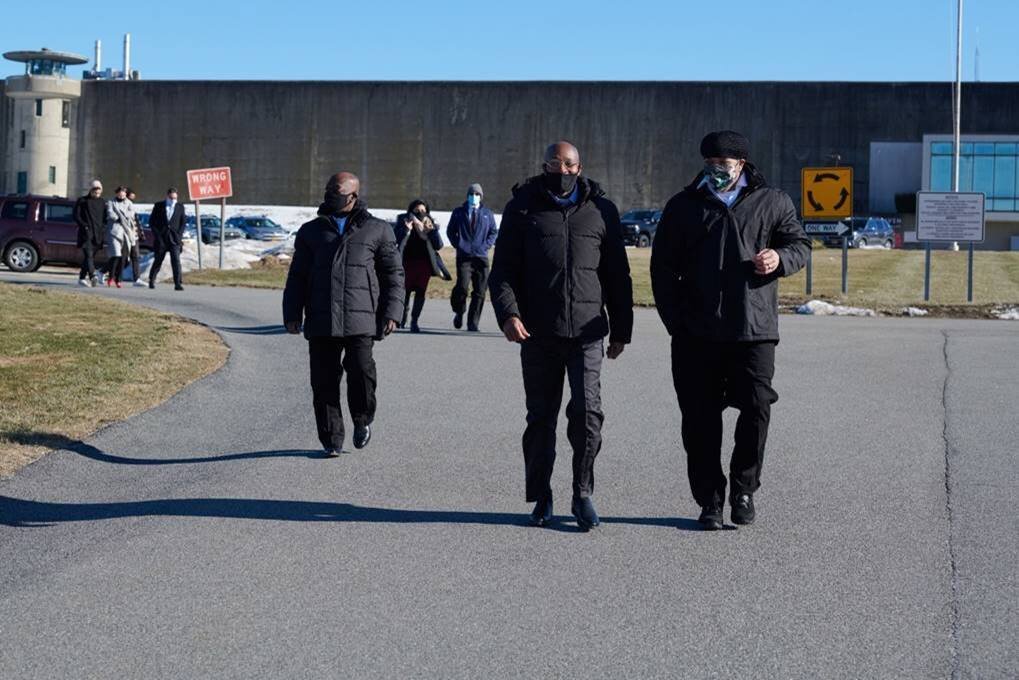Police misconduct in Queens drives ballooning cost of settlements
/From left, Rohan Bolt, George Bell and Gary Johnson walk free from prison after their wrongful convictions were overturned in 2021. Police misconduct lawsuits brought by the three Queens men resulted in nearly $50 million in settlement payouts. File photo by Enrique Klaus
By Jacob Kaye
The city is on pace to hand out a record amount of tax-payer dollars to settle police misconduct cases this year, thanks in no small part to a number of cases where police misconduct led to the wrongful convictions of Queens residents.
Through the first seven months of 2024, the city has paid out over $82 million in lawsuits alleging police misconduct, according to an analysis compiled by the Legal Aid Society released on Monday. That puts the city on track to total over $140 million in payouts by the end of the year, the public defense firm said.
The total would mark one of the largest figures the city has had to payout in years, according to the Legal Aid Society.
Driving up the payouts so far this year were a number of lawsuits brought by Queens residents who spent time behind bars for crimes they did not commit.
Of the top 10 most expensive police misconduct settlements paid this year, three went to wrongly convicted Queens men. Together, they accounted for around $32.7 million – or around 40 percent – of the total payouts in 2024.
A number of the other large settlements reached between the city and police misconduct accusers relate to alleged abuses committed by the NYPD during the racial justice protests that ran through the summer of 2020 in response to the police killing of George Floyd.
Jennvine Wong, the supervising attorney of the Cop Accountability Project at the Legal Aid Society, blamed the culture of the NYPD for the rising costs of police misconduct settlements.
“The ‘no rules, no consequence’ culture that thrives within the NYPD not only undermines public safety, but diverts precious taxpayer dollars away from critical services that New Yorkers depend upon,” Wong said.
“Most glaring, we can surmise that based on the NYPD’s refusal to discipline their own, many of the members of service named in these lawsuits are still on the job, earning their full salary, carrying a gun, wearing a badge, and policing our neighborhoods,” she added.
Police misconduct settlements have increased significantly over the past four years.
In 2020, the city paid $62 million in police misconduct settlements. The following year, that total rose to $87 million. In 2022, over $135 million was made in settlements. Last year, police misconduct settlements cost the city $115 million.
The total made in payouts so far in 2024 is already larger than the total made in payouts in 2018, 2019 and 2020.
Also rising over the past several years has been the average payout.
In 2018, the average New Yorker settling a police misconduct claim was paid $48,000. Last year, that number rose to $142,064.
Of the payments made in 2024, the average plaintiff was paid $197,520, according to the Legal Aid Society.
The jump in the average individual payments come as a number of Queens men have received some of the largest settlement payments in the past five years for alleged police misconduct that contributed to them spending decades behind bars for crimes they didn’t commit.
This year, three of the largest settlements came from three men from the World’s Borough who were found by a judge to have been wrongfully convicted.
Among them were Gary Johnson and Rohan Bolt, who, along with George Bell, spent a combined 72 years in prison for a 1996 double murder none of them took any part in.
Though Bell settled his misconduct claim against the city last year, the three men received $47.7 million combined for their wrongful convictions, which came after police – and prosecutors, according to a Queens judge – failed to share evidence with the defense and the jury that would have likely led to the trio’s acquittal.
After hours of interrogation, Bell and Johnson admitted to the double murder of police officer Charles Davis and Ira Epstein, the owner of an East Elmhurst check cashing business in December 1996 – Bolt maintained his innocence. However, their confessions, which they later recanted, came only after they were physically assaulted by police officers and coerced into admitting to the crime, their lawsuits alleged.
In Bell’s case, the then-19-year-old was allegedly beaten by several officers, including one named Louis Pia, who allegedly told the teen that he would “put him in a f–king hospital.”
In addition to the alleged abuse by police, the officers and prosecutors had evidence at the time of Bell, Bolt and Johnson’s trial that suggested that a gang known as Speedstick was behind the murders – the gang had been committing similar armed robberies throughout the area for some time.
However, none of the evidence was ever shared in court, and the three Queens men were each sentenced to life in prison.
In 2021, Johnson, Bell and Bolt had their convictions overturned following an investigation by the Queens district attorney’s Conviction Integrity Unit. The two assistant district attorneys who had originally prosecuted the case, Brad Leventhal and Charles Testagrossa, both resigned from their respective positions with the Queens DA’s office and the Nassau DA’s office following the ruling, though it remains unclear if either suffered any disciplinary consequences as a result of the misconduct.
In April, Bolt settled his lawsuit against the city for $15.2 million and Johnson settled his for $15 million. Bell had settled the year prior for $17.5 million.
The settlements rank as the second, third and fourth largest police misconduct payouts of the past seven years in New York City.




